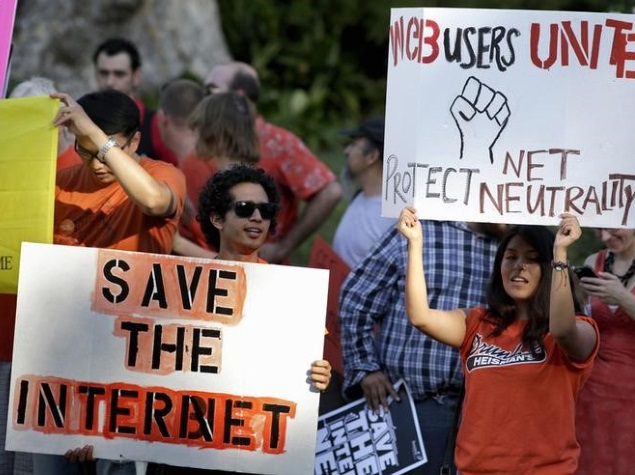- Home
- Internet
- Internet News
- US FCC Stops Accepting Net Neutrality Comments; to Continue Outreach
US FCC Stops Accepting Net Neutrality Comments; to Continue Outreach

Monday is the deadline for submitting comments to the Federal Communications Commission on so-called Open Internet rules that regulate how Internet service providers (ISPs) manage traffic on their networks.
A record 1.5 million comments have already flooded the agency since Chairman Tom Wheeler revealed his proposal in April. Consumer advocacy groups pounced on proposed rules they saw as creating fast and slow "lanes" on the web.
Under the proposed rules, ISPs such as Comcast Corp would be prohibited from blocking users' access to websites or applications but could charge content companies, such as Netflix Inc, to ensure quick and reliable delivery of their traffic to users, as long as such deals are deemed "commercially reasonable."
The FCC plans several workshops in coming weeks on technological, economic and legal aspects of the rules, which will be open to the public in Washington and will be streamed live online. People can submit comments to FCC staff by email and on Twitter.
The first two workshops on Tuesday will focus on policy approaches to the rules and how mobile broadband should be treated.
No formal deadline exists for the FCC to set new rules, which require a majority vote at the five-member FCC for approval. The workshops are planned through early October, so the vote is unlikely before November.
Wheeler has said he wanted to set new rules as quickly as possible, given the void created by a federal court's rejection in January of the FCC's earlier version. That means he could present a new draft of the rules before the end of the year.
Responding to calls for action from advocacy groups and a segment by comedian John Oliver on his HBO show, Americans overwhelmed the FCC with comments through online automated submission forms, email and mail.
The net neutrality submissions smashed the FCC's previous record of 1.4 million comments submitted about singer Janet Jackson's accidental breast exposure during the Super Bowl halftime show in 2004. They also trumped more than 1 million comments the U.S. State Department last year said it had received on its environmental review of the Keystone XL pipeline.
The outcry on net neutrality, triggered in part by what insiders said was a leak of the unfinished proposal, has prompted Wheeler to alter the plan to ask whether "some or all" pay-for-priority deals should be banned and whether ISPs should be entirely reclassified to face regulations more like public utilities, an approach backed by advocacy groups.
Wheeler has repeatedly reassured the public of his intent to police any discrimination, which ISPs say would not be in their business interest anyway. FCC staff have also held several online question-and-answer sessions and are likely to do others.
© Thomson Reuters 2014
Catch the latest from the Consumer Electronics Show on Gadgets 360, at our CES 2026 hub.
Related Stories
- Samsung Galaxy Unpacked 2025
- ChatGPT
- Redmi Note 14 Pro+
- iPhone 16
- Apple Vision Pro
- Oneplus 12
- OnePlus Nord CE 3 Lite 5G
- iPhone 13
- Xiaomi 14 Pro
- Oppo Find N3
- Tecno Spark Go (2023)
- Realme V30
- Best Phones Under 25000
- Samsung Galaxy S24 Series
- Cryptocurrency
- iQoo 12
- Samsung Galaxy S24 Ultra
- Giottus
- Samsung Galaxy Z Flip 5
- Apple 'Scary Fast'
- Housefull 5
- GoPro Hero 12 Black Review
- Invincible Season 2
- JioGlass
- HD Ready TV
- Laptop Under 50000
- Smartwatch Under 10000
- Latest Mobile Phones
- Compare Phones
- Honor Magic 8 RSR Porsche Design
- Honor Magic 8 Pro Air
- Infinix Note Edge
- Lava Blaze Duo 3
- Tecno Spark Go 3
- iQOO Z11 Turbo
- OPPO A6c
- Samsung Galaxy A07 5G
- Lenovo Yoga Slim 7x (2025)
- Lenovo Yoga Slim 7a
- Lenovo Idea Tab Plus
- Realme Pad 3
- Moto Watch
- Garmin Quatix 8 Pro
- Haier H5E Series
- Acerpure Nitro Z Series 100-inch QLED TV
- Asus ROG Ally
- Nintendo Switch Lite
- Haier 1.6 Ton 5 Star Inverter Split AC (HSU19G-MZAID5BN-INV)
- Haier 1.6 Ton 5 Star Inverter Split AC (HSU19G-MZAIM5BN-INV)







![[Sponsored] Haier C90 OLED TV | Dolby Vision IQ, 144Hz OLED and Google TV in Action](https://www.gadgets360.com/static/mobile/images/spacer.png)









